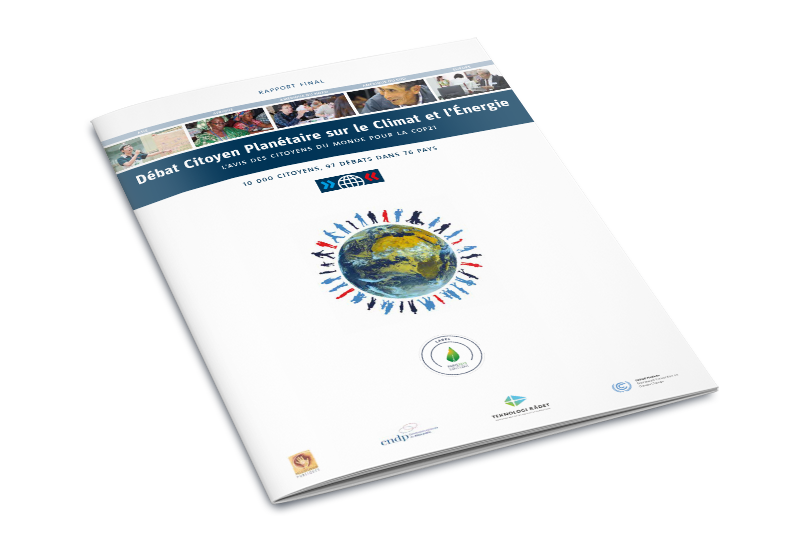CONTEXT AND GOALS
The initiative for a global debate was rooted in our deeply-held conviction that, when it comes to critical issues such as climate change, citizen participation is necessary at a worldwide level, and that it can bring real added value to international negotiations. The project’s aim was twofold – to prove that it is possible to roll out a global-level consultation and to play a role in the construction of the Paris agreement, so that it was designed not only for citizens but with them.
The debate also followed the logic of Article 6 in the United National Framework Agreement on Climate Change, which encourages governments to promote “public participation in addressing climate change and its effects and developing adequate responses”.
“In 100 countries around the world, 100 citizens will come together to give their view on the main issues under negotiation. A sort of global-level citizens’ consultation.
François Hollande
President of the French Republic
PROCEDURE
This worldwide citizens’ debate was based on four fundamental pillars:
- Launching a coalition to coordinate and finance the project and make sure it was integrated into the official negotiating process.
- Rolling out a day-long debate in a maximum number of participating countries, all following the same format everywhere.
- Implementing an impact strategy designed to have an influence on the negotiations.
- A training programme and follow-up for all national partners in charge of the dialogues in their countries.
The day’s debate was divided into four or five themed sessions. An introductory video was shown to illustrate each issue to be debated, then each citizen was given a multi-choice questionnaire. Groups of five to eight citizens discussed the issues before forming working groups assisted by a facilitator at each table. At the end of each session, each citizen voted individually.
As the sessions progressed, the results were coded via an online platform and published immediately. Via the platform, results could be compared within one country and between countries and groups of countries.
OUR ADDED VALUE
The World Wide Views debate provided the international negotiations with the informed views of citizens from around the world. As such, it opened discussions between the people responsible for making decisions and those to whom they apply.
The consultation brought a long-term vision, not restricted by political cycles or national barriers.
The citizens’ debate is not a survey and produces qualitative results helping to identify key issues that are often submerged or remain vague in conventional opinion polls. It reveals citizens’ expectations, regardless of geographic or social differences.
Given the credibility of these results (citizens are well informed and have had the chance to express their views on the subject and discuss them), the debate gives policy-makers a sound basis when entering into dialogue with national or international counterparts, making them all the more aware of the issues and the stances that they take, whether or not they gain public support. The results show the extent to which citizens are ready commit.
Although the project was not specifically a “campaign”, it helped raise public awareness of the challenges and opportunities at stake. It is also an example of how to increase the legitimacy and transparency of global governance by giving ordinary citizens a chance to play an active role in decision-making processes.
“Bringing forward the views and the voices of citizens from across the globe can only contribute to a positive new universal climate agreement in Paris in December.
Christiana Figueres
Executive Secretary of the UNFCCC
KEY FIGURES
OUTCOMES
The methodology, calendar, and speed with which the results were collected had a noticeable effect on political consciences and on citizens. On the one hand, the questions each one of us has on climate and energy were addressed during this consultation, as reflected in the information material (explanatory booklet, videos and questionnaire) and in the widespread publication of the results. On the other hand, the consultation fed into the development of a model for global debate on other issues (WWviews on Space, Cop 22 West Africa). The outcome is a set of convergent expectations and red lines, laid down by the citizens for the attention of policymakers as they build on the foundations of the Paris agreement.
This kind of process has also demonstrated the relevance and feasibility of scaled-up citizen participation.
DELIVERABLES






